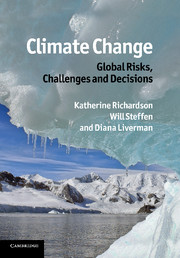Book contents
- Frontmatter
- Contents
- Writing team
- Foreword
- Preface
- List of acronyms and abbreviations
- Part I Climatic trends
- Part II Defining ‘dangerous climate change’
- Part III Equity issues
- 9 The equity challenge and climate policy: responsibilities, vulnerabilities and inequality in the response to climate change
- 10 A long-term perspective on climate change: values and ethics
- Part IV Mitigation and adaptation approaches
- Part V Meeting the challenge
- Index
- Plate section
- References
10 - A long-term perspective on climate change: values and ethics
Published online by Cambridge University Press: 04 April 2011
- Frontmatter
- Contents
- Writing team
- Foreword
- Preface
- List of acronyms and abbreviations
- Part I Climatic trends
- Part II Defining ‘dangerous climate change’
- Part III Equity issues
- 9 The equity challenge and climate policy: responsibilities, vulnerabilities and inequality in the response to climate change
- 10 A long-term perspective on climate change: values and ethics
- Part IV Mitigation and adaptation approaches
- Part V Meeting the challenge
- Index
- Plate section
- References
Summary
‘There is no getting away from the fact that making policy towards climate change unavoidably requires one to take stance on ethical questions…’
The equity dimensions of the climate change challenge discussed in the previous chapter are central to the current debate and, if not solved, will frustrate any attempts to find truly global solutions. The strong focus of the policy dialogue on the present and near future is appropriate and necessary to turn around the trajectory of greenhouse gas emissions and, hopefully, avert what many consider to be dangerous climate change. But just as longer-term studies of the dynamics of the Earth System in the past provide insights into the behaviour of the climate system today, a much longer gaze into the future can provide insights into the implications of the choices and decisions that we are making today.
Our ancestors have clearly shown an ability to think about their long-term futures, and to organise their institutions, economies and resource base to deliver desired outcomes hundreds of years into the future. If they had not had this capability, we would today be unable to marvel at the Great Wall of China, the exquisite ruins of the Mayan civilisation in meso-America, the great cathedrals of medieval Europe or the hauntingly beautiful old Buddhist city of Bagan in northern Myanmar (Figure 10.1). Our ancestors also differed from contemporary society in their capability to integrate utilitarian and spiritual views of the rest of nature.
- Type
- Chapter
- Information
- Climate Change: Global Risks, Challenges and Decisions , pp. 260 - 278Publisher: Cambridge University PressPrint publication year: 2011

